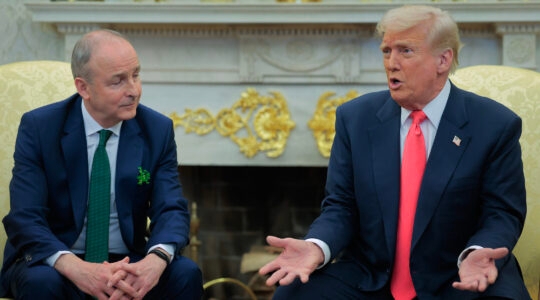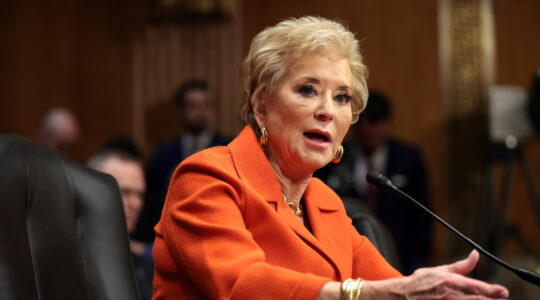
Hillary Rodham Clinton speaking at the American Jewish Committee’s Global Forum, May 14, 2014. (Ronald Sachs)
WASHINGTON (JTA) – A month before her foreign policy autobiography, “Hard Choices,” hits the bookstores, Hillary Rodham Clinton made an easy choice: She pitched her diplomatic credentials to a friendly Jewish audience.
Clinton’s speech to the American Jewish Committee on May 14 was meant to send a signal to the pro-Israel community, insiders say, that a Clinton presidency would smooth over tensions ruffled by the Obama White House. So while she broadly defended Obama administration policies, she also suggested areas where she had differences with the president, such as on Iran.
“President Obama has said that the odds of reaching a comprehensive agreement are no more than 50-50,” Clinton said, referring to the U.S.-led talks between the major powers and Iran on the latter’s nuclear program.
“I personally am skeptical that the Iranians will follow through and deliver. I’ve seen many false hopes dashed over the years,” she said. “We will have to be tough, clear-eyed and ready to walk away and increase the pressure if need be.
“No deal is better than a bad deal,” Clinton told the non-partisan group, which does not endorse candidates. “From my perspective, we cannot and should not accept any agreement that endangers Israel or our own national security.”
Robert Wexler, the former Democratic congressman from Florida who was the first major Jewish politician to join the Obama campaign, in early 2007, said the differences Clinton is emphasizing reflected not just her worldview, but also the changed foreign policy reality she heads into should she announce for the presidency.
“President Obama, in terms of foreign policy, was elected to end the wars in Iraq and Afghanistan — that was his primary charge,” said Wexler, who now heads the Center for Middle East Peace. “The expectations the American people would have for a President Hillary Clinton would be different. The calling may be to reassert to a degree of American leadership, which is entirely consistent with Secretary Clinton’s worldview.”
Aaron David Miller, a former Middle East negotiator under a succession of Republicans and Democrats, including Bill Clinton, said Hillary Clinton was a good soldier for Obama’s bid to transform the world, but also demonstrated understanding that her boss may have overreached.
“She understood the world was not a transformative place, it was transactional,” said Miller, now vice president at the Wilson Center, a foreign policy think tank. “In that respect she was much more hawkish on Syria,” where Clinton joined calls for a U.S. strike on the Assad regime to contain the bloody civil war. Obama opted to seek authorization for a strike from Congress, and then abandoned the option when it was clear he lacked support.
“On Israel-Palestinians she knew it was not going anywhere,” Miller said. “If the president wanted her to focus on it, she did it in a rhetorical way, but she had no interest in being a linchpin.”
That, Miller said, was in contrast to John Kerry, her successor, who made the revival of Israeli-Palestinian talks a centerpiece of his policy only to see them collapse last month.
The June 10 release of “Hard Choices” is widely perceived as Clinton’s opening salvo for a 2016 run for the Democratic presidential nod, the prize Obama took from her in a bitter 2008 primary election. As her Jewish campaign goes forward, a source close to Clinton said, she and others close to her will subtly introduce three areas of Middle East policy in which her 2008 differences with Obama were validated over time.
They include two postures that got her into trouble with the Democratic base in 2008 and helped contribute to her defeat: Her stated opposition during the primaries to meeting with Mahmoud Ahmadinejad, Iran’s then-president, and her support as a U.S. senator from New York for legislation that would have designated Iran’s Islamic Revolutionary Guards Corps as a terrorist group.
Obama said during the campaign that he would meet with Ahmadinejad, seen as a Holocaust denier and seeker of Israel’s destruction. Obama’s campaign also mercilessly ripped Clinton for backing the Revolutionary Guards designation, likening it to her support for the legislation used by President George W. Bush to go to war with Iraq.
The third difference to be highlighted is Clinton’s opposition during the ’08 campaign to participating in Durban II — the 2009 reprise of the 2001 U.N. anti-racism conference that devolved into an anti-Israel free-for-all. Obama would not commit during the campaign to boycotting the ’09 conference.
In each case, the source argued, Clinton was vindicated. Ahmadinejad ignored Obama’s spring 2009 call for dialogue with Iran’s leadership. The legislative bid to designate the Revolutionary Guards as terrorist did not pass, but the guards were implicated in the violent repression of mass Iranian protests following the contested 2009 presidential election and were accused of torturing and raping men and women in prisons around Iran.
As for Durban II, the Obama administration at first sought avenues through which U.S. participation would prevent an anti-Israel tone, but eventually conceded this was unlikely and chose not to participate. The person who made the decision was Samantha Power, then a National Security Council member, who had derided Clinton as a “monster” during the campaign and championed engagement in international forums.
Clinton will face fierce resistance from Republicans to any bid to differentiate herself from Obama. Republicans in the U.S. House of Representatives already are investigating her role in securing the consulate in Benghazi, Libya, before and after a September 2012 attack that left four Americans dead.
In her AJC speech, Clinton said she helped shepherd sanctions through Congress that in 2010 set the stage for the pressures on Iran that brought about Iranian President Hassan Rouhani’s election.
Sen. Mark Kirk (R-Ill.), a key sponsor of those sanctions, derided the claim.
“The fact is the Obama administration has opposed sanctions against Iran led by Sen. Menendez and me every step of the way, as was thoroughly documented at the time,” Kirk said in an email to JTA, referring to Robert Menendez (D-N.J). “I agree with Secretary Clinton that U.S. sanctions have proven successful, but it was the Congress, not the White House, that led the way.”
At the time, Obama administration officials said they wanted to delay the sanctions until they were undergirded by U.N. Security Council sanctions, a sequence Clinton noted in her speech. After the Security Council resolutions were in place, Obama green-lighted the congressional sanctions.
Steven Rabinowitz, a publicist who works with Jewish and Democratic groups, said Clinton might have work to do in a pro-Israel community that had avidly embraced her during her Senate career.
“I hope people can draw the distinction between Hillary the person who we know and love and Hillary the loyal secretary of state for the guy who beat her and embraced her,” Rabinowitz said.
Judging from the reaction to her AJC speech, Clinton is on her way. Speaking immediately after her was Matthew Bronfman, a member of the group’s executive council.
“Thank you Madam Secretary, and speaking of hard choices, we know you have a hard choice to make coming up soon, and speaking on behalf of AJC we hope you make the right one,” he said.
The crowd whooped its delight.
JTA has documented Jewish history in real-time for over a century. Keep our journalism strong by joining us in supporting independent, award-winning reporting.





